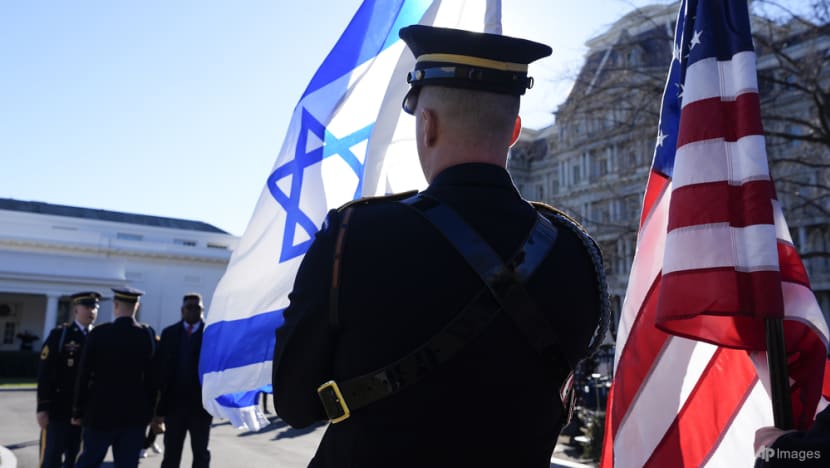Trump and Netanyahu set for pivotal talks on Middle East agenda

Flags are prepared for the arrival of Israeli Prime Minister Benjamin Netanyahu outside the East Wing of the White House, Tuesday, Feb. 4, 2025, in Washington. (AP Photo/Alex Brandon)
WASHINGTON: When Benjamin Netanyahu meets US President Donald Trump on Tuesday (Feb 4), the Israeli prime minister is expected to try to turn the page on tense relations with the Biden White House as the two leaders address the future of the Gaza ceasefire and ways to counter Iran.
But Netanyahu, the first foreign leader to be hosted by Trump since the pro-Israel president's Jan 20 inauguration, could also come under pressure from an American leader whose policy goals for the Middle East may not always match up with Netanyahu's interests.
Their meeting coincided with the start of mediation efforts between Israel and Hamas on the crucial second stage of the ceasefire deal and hostage release.
The Middle East is at a critical juncture, with the Gaza truce fragile, a parallel Israel-Hezbollah ceasefire agreement in Lebanon nearing possible expiration and concerns about Iran's nuclear ambitions persisting despite its weakened state.
Adding to the unease is Trump's recent suggestion that Gazans should be moved to neighbouring ring countries such as Egypt and Jordan - a proposal he repeated on Tuesday before Netanyahu's White House arrival. Trump said Palestinians had no alternative but to leave the war-shattered enclave.
That echoed the wishes of Israel's far right and contradicts former President Joe Biden's commitment against the mass displacement of Palestinians.
Arab states and the Palestinian Authority have rejected the idea, which some human rights advocates have likened to ethnic cleansing.
In his first term, Trump handed Netanyahu a series of successes, including the relocation of the US embassy to Jerusalem from Tel Aviv and the signing of the Abraham Accords, normalising relations between Israel and several Arab states.
He remains a strong supporter of US ally Israel, taking credit for helping broker the Gaza ceasefire deal between Israel and Hamas militants in the Palestinian enclave even before he returned to office while insisting he wants to end the wars in the Middle East.
Trump has said he hopes to renew an effort toward historic normalization of relations between Israel and Arab power Saudi Arabia, and US officials said that goal, plus maintaining the Gaza ceasefire, would be a focus of the White House talks.
Trump's broader regional ambitions have created uncertainty over how much leeway Trump will give Netanyahu. The prime minister faces demands from far-right members of his coalition threatening to topple his government unless he restarts the fighting in Gaza to fulfill his pledge to destroy Iran-backed Hamas.
An ever-raging war would complicate if not block Trump's attempt to bring the Saudis to the negotiating table.
Though Biden maintained military support for Israel after Hamas' Oct 7, 2023, attack that prompted the Israeli assault on Gaza, relations were strained at times over the high Palestinian civilian death toll and Netanyahu's defiance of US demands.
Now in his second term, Trump appeared determined to get off on the right foot with Netanyahu, scheduling a joint press conference and a dinner afterwards.
"NO ASSURANCES"
Trump's Middle East envoy, Steve Witkoff, played a key role in helping the Biden administration secure the long-sought Gaza deal before the Jan 20 transfer of power in the US. The first phase has led to Hamas' release of 18 hostages and Israel's release of hundreds of jailed Palestinians.
"We're in Phase 2 now," Witkoff told reporters. He said he met Netanyahu on Monday to discuss parameters for the policy negotiations and would meet the prime minister of Qatar, a mediator in the negotiations, in the US on Thursday.
On Monday, Trump acknowledged to reporters that there were no assurances that the ceasefire would hold.
Trump and Netanyahu have both said they want to include Saudi Arabia in the Abraham Accords, an effort that could help create a regional bulwark against Iran.
But Netanyahu's steadfast opposition to any move towards a Palestinian state, a stance supported by a growing number of Israelis in the wake of the Gaza war, stands as a potential obstacle to a deal with Saudi Arabia. Riyadh has previously insisted on agreement at least on a pathway to an independent Palestine.
For Netanyahu, whose international isolation over the Gaza war was underlined by an arrest warrant from the International Criminal Court (ICC) on allegations of war crimes, the visit offers a chance to burnish his diplomatic credentials in Washington, which has come out strongly against the ICC.
Pro-Palestinian activists as well as those calling for the release of the remaining hostages held by Hamas plan separate protests to coincide with Netanyahu's visit to Washington.
Netanyahu will meet other senior Trump aides during his visit as well as congressional leaders and is expected to seek assurances of continued US weapons supplies.
Within days of returning to the White House, Trump approved a shipment of 2,000-pound bombs to Israel that the Biden administration had blocked.
High on the agenda for Tuesday's talks will be Iran, which last year launched hundreds of missiles and drones against Israel, drawing Israeli retaliation that was said to have crippled Tehran's air defences.
Trump quit an international nuclear deal with Tehran in 2018 and both he and Netanyahu have vowed to stop Iran from developing nuclear weapons. Meanwhile, concerns have grown in Iran that the new president might give Netanyahu the go-ahead to hit its nuclear sites.



















